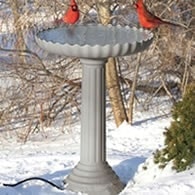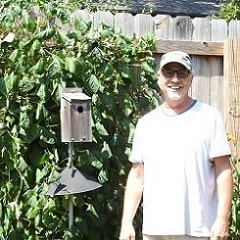Why Do Baby Birds Poop Right After Eating
The quick answer would be that baby birds have a faster metabolism and a more rapid digestive process. But there's more to the baby bird poop story than that.
Follow along as we delve into the fascinating world of avian biology and behavior to answer the question, "Why do baby birds poop right after they eat?"

The Diet of Baby Birds and its Role
The diet of baby birds plays a significant role in how quickly baby birds poop.
The composition of their food, often high in protein and essential nutrients, contributes to the rapid digestion and absorption of nutrients.
This dietary aspect further emphasizes the metabolic efficiency of young birds and their ability to extract vital resources from their meals.
The Nest: A Haven for New Life
The bird nest serves as the epicenter of a bird's life, a carefully crafted haven that cradles the beginnings of existence.
Nesting is a critical phase in the reproductive cycle of birds, and it is within these cozy confines that the saga of baby birds' immediate post-meal bathroom breaks unfolds.
Parental Duties: A Tale of Sacrifice and Care
Parent birds play a crucial role in nurturing their offspring, and it is their selfless dedication that sets the stage for the intriguing phenomenon of post-feeding bowel movements.
From the moment the first egg is laid to the fledgling stage, adult birds tirelessly work to ensure the survival of their progeny.
Mother Birds: The Architects of Life
Among parent birds, mother birds often take the lead in constructing the nest, creating a safe and secure environment for their eggs and chicks.
The intricate design of the nest becomes the hub of the family's activities, with every element serving a specific purpose - including the disposal of waste.
Bird Droppings: Nature's Recycling
The expulsion of waste, or bird droppings, is a fundamental aspect of avian life.
It serves not only to rid the body of metabolic byproducts but also plays a crucial role in maintaining the hygiene of the nest.
For young birds, this process takes an interesting turn with the use of fecal sacs.
Fecal Sacs: A Parent's Cleaning Tool
Fecal sacs are small, mucous-covered packages that encapsulate the waste produced by chicks ensuring cleanliness in the nest.
This adaptation serves a dual purpose: it aids in waste disposal and minimizes the risk of predators detecting the presence of vulnerable chicks.
The rapid removal of fecal sacs by parent birds is a testament to the efficiency of this waste management system.
The Male and Female remove these fecal sacs each time they return to the nest with food.
Why Mother Bird Eats Fecal Sacs
So why does the mother bird eat the baby birds poop? First, both adult birds eat the fecal sacs.
When the nestlings are young, the foods goes thorough fast enough to leave nutrients and be safe. The adults can use thes extra nutrients during this busy time.
As the young birds get older and their diet changes, harmful bacteria may be in the waste.
Instinctively, the adults know not to eat these and will carry the sacs away and discard them.
Why do Baby Birds Poop So Fast?
Now, let's explore the speed at which baby birds seem to evacuate their bowels right after a meal.
Unlike adult birds, baby birds have a faster metabolism and a more rapid digestive process.
This heightened metabolic rate is a survival mechanism, allowing them to quickly process and extract nutrients from their food.
Wild Birds: Masters of Adaptation
In the wild, where survival is a constant challenge, the ability to efficiently process food and eliminate waste becomes paramount.
The quick turnaround of baby bird poop after a meal is a testament to the adaptability and resourcefulness of these feathered creatures.
Rear End Realities: Understanding the Anatomy
The anatomy of a bird, particularly its digestive system, sheds light on the immediacy of post-meal poop.
Unlike mammals, birds have a cloaca, a single opening for excretion and reproduction.
This streamlined system expedites the elimination of waste, allowing baby birds to maintain optimal digestive efficiency.
A Strategic Choice
The location of the nest plays a crucial role in the disposal of waste.
Nature has equipped baby birds with an instinct to position themselves at the rim of the nest when the call of nature strikes.
This strategic choice minimizes the chances of contamination within the nest, preserving a clean and healthy environment for growth and development.
Do Birds Poop In The Nest?: An Evolutionary Advantage
In some cases, certain bird species have evolved to take the disposal of waste a step further.
Some chicks, rather than eliminating waste within the nest, may move to the rim of the nest and try to evacuate out and over the rim of the nest.
This behavior is an adaptive strategy to further reduce the risk of predation and maintain the nest's camouflage. It can also end up very messy.
A Symphony of Life in Every Droplet
In the intricate avian world, the immediate post-meal poop of baby birds emerges as a symphony of life - a blend of biological adaptations, parental care, and survival strategies.
As we marvel at the sight of tiny birds perched at the rim of their nests, releasing small packages of poop into the world, we gain a deeper appreciation for the intricacies of nature's design.
The cycle of birth, growth, and the inevitable call of nature continues to unfold, reminding us that even in the smallest droplet, there is a story of life and the perpetual dance of the wild.

|

|

|

|
| Readers Digest Guide | Golden Guide | Your State Only | Nat-Geo Guide |



